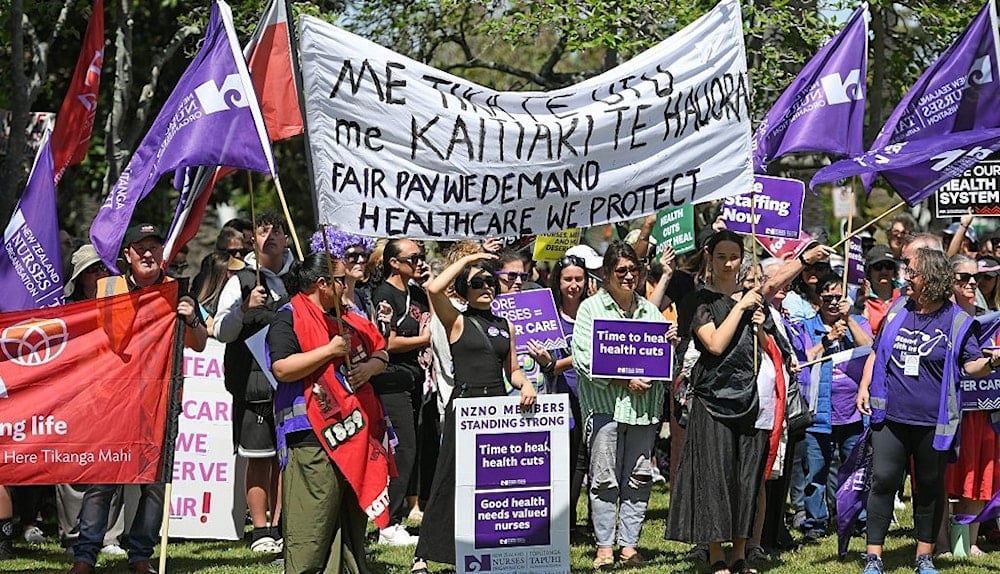100,000 strike in New Zealand over public service cuts
Over 100,000 public sector workers in New Zealand, including teachers, nurses, and health staff, strike to protest underfunding, low pay, and poor conditions, in one of the country’s largest industrial actions.
-

Footage from the nurse and public health sector strike in New Zealand over Public service cuts, undated (Getty Images/AFP)
An estimated 100,000 public sector workers across New Zealand staged a nationwide strike on Thursday, demanding the government take urgent action to fund and resource public services. The strike, one of the largest in the country’s history, united over 60,000 school teachers, 40,000 nurses and salaried medical specialists, and 15,000 public service employees.
Despite extreme weather forcing cancellations in Wellington and other regions, tens of thousands rallied across the country, holding signs and chanting slogans calling for immediate government investment in the country’s strained education and healthcare systems.
The mass walkout followed stalled collective bargaining between multiple unions and the coalition government. Though each sector presented specific demands, the concerns were widely shared: insufficient pay, unsafe staffing levels, lack of resources, and worsening working conditions, putting both workers and the public at risk.
"Patients should not have to be harmed, or die, before things improve," said nurse Becks Kelsey during a rally in Auckland according to The Guardian, adding, "We demand the government invests in the very fabric of our community, not cut the threads that hold it together."
Secondary school teacher Paul Stevens warned that educators were leaving the profession and the country due to poor treatment. "They have just had enough and they don’t feel valued," he said, explaining that "We need our politicians to do their job and acknowledge the political choices they have made to gradually starve our essential public services."
Teachers and nurses voice safety and retention concerns
In Hawke’s Bay, nurse Noreen McCallan warned of dire conditions in hospitals. "Staff shortages have become overwhelming and exhausting for many of us. Our patients are suffering longer because we can’t get to them as quickly as we should," she said, as cited by The Guardian.
A teacher in Palmerston North, Liam Rutherford, said the government’s current offer would not improve recruitment or retention. He said, "The pull of Australia is too much," citing better pay and job prospects abroad.
New Zealand’s public health and education systems have come under growing pressure in recent years, with hospitals warning of "catastrophic failure" due to overcapacity and schools grappling with staffing shortages. Yet the government has responded with funding cuts and by canceling dozens of pay equity claims, arguing this is necessary to grow the economy.
Prime Minister Christopher Luxon dismissed the strike as "politically motivated," while senior ministers labeled it "unfair, unnecessary, and unproductive." Public Service Minister Judith Collins said unions were “out on the street with megaphones” while the government was “at the table with offers,” calling the strike a "stunt" that would harm children and patients.
Many schools closed and healthcare providers scaled back non-essential services during the strike. However, public sentiment remains largely in favor of the action. A Talbot Mills poll found that 65% of New Zealanders support the strike, including nearly half of those who voted for the current coalition government.

 3 Min Read
3 Min Read









